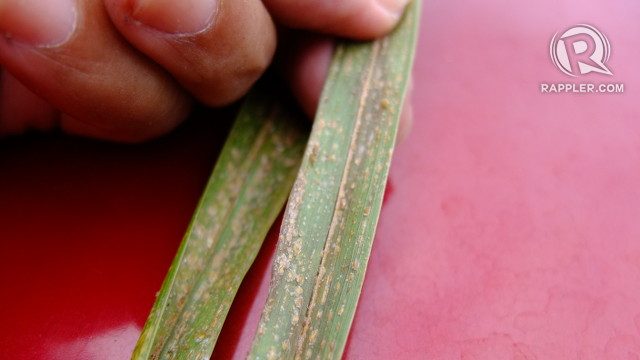SUMMARY
This is AI generated summarization, which may have errors. For context, always refer to the full article.

MANILA, Philippines – The coconut scale insect that has laid waste to almost 3 million trees in Calabarzon region and Basilan province has been reduced to manageable numbers, said food security czar Francis Pangilinan on Wednesday, February 11.
A 6-month action plan by the government has brought the infestation out of outbreak levels, added Pangilinan, who is presidential assistant for food security and agricultural modernization.
“This means that the trees that had severe infestation prior to treatment now have moderate infestation. Those that had moderate infestation now have low infestation, and those with low infestation now have almost zero infestation.”
The infestation of a total of 1.1 million trees have now been “controlled,” he added. In these trees, the infestation was reduced by as much as 90%.
If there were 58 hotspots of the infestation in June 2014 when the outbreak began, there are now only 9 hotspots to worry about, he added.
The 9 hotspots are:
- Balayan, Batangas
- Calaca, Batangas
- Bay, Laguna
- San Pablo, Laguna
- Mauban, Quezon
- Sampaloc, Quezon
- Candelaria, Quezon
- Polillo Island, Quezon
- Basilan, Isabela
The figures were arrived at after a rapid ground assessment conducted from November to December 2014.
At its peak in August, the infestation affected 2.7 million trees, making their nuts and leaves unusable and thus affecting the livelihood of 330,000 coconut farmers.
The government action plan, promulgated by an emergency executive order by President Benigno Aquino III, involved injecting insecticide into 1.6 million trees.
Nature also helped. Typhoon Glenda, which ravaged parts of Luzon in July 2014, reduced the infestation by 425,000 trees.
To prevent the spread of the insect, the action force established 23 quarantine checkpoints in strategic areas to protect high-risk regions like Bicol, Samar, Leyte and Mindanao.
Here to stay
Aside from managing the outbreak, the action plan involved helping coconut farmers survive the loss of their trees.
The tree treatments benefited almost 9,000 farmers. Around P52.8 million worth of income of farmers was replaced, said Pangilinan.
The operation provided livelihood to 27,134 village workers.
Despite the progress made, Pangilinan said, the coconut scale insect, dubbed the “Typhoon Yolanda of pests,” is here to stay. Scientists in the task force say because of the nature of the insect, it cannot be completely eradicated from the country.
Every now and then, the pest, which can be spread by wind, may infest trees in other places.
In total, the government spent P177 million ($4 million) to carry out the operation. This represents 24% of the P750 million ($17 million) allotted by a supplementary budget specifically to manage the outbreak.
The rest of the funds will be used for quick response teams, surveillance and immediate treatment in case an infestation rears its ugly head again. The remaining budget will also be used to maintain the checkpoints and continue pruning and treatment in the remaining 9 hotspots.
Some funds will be given to local governments at the frontlines of the infestation.
Though the coconut scale insect remains in the country, Pangilinan said that the government is now more prepared than it was in 2010 – when the insect was discovered in Batangas – to handle a future outbreak. – Rappler.com
Add a comment
How does this make you feel?
There are no comments yet. Add your comment to start the conversation.